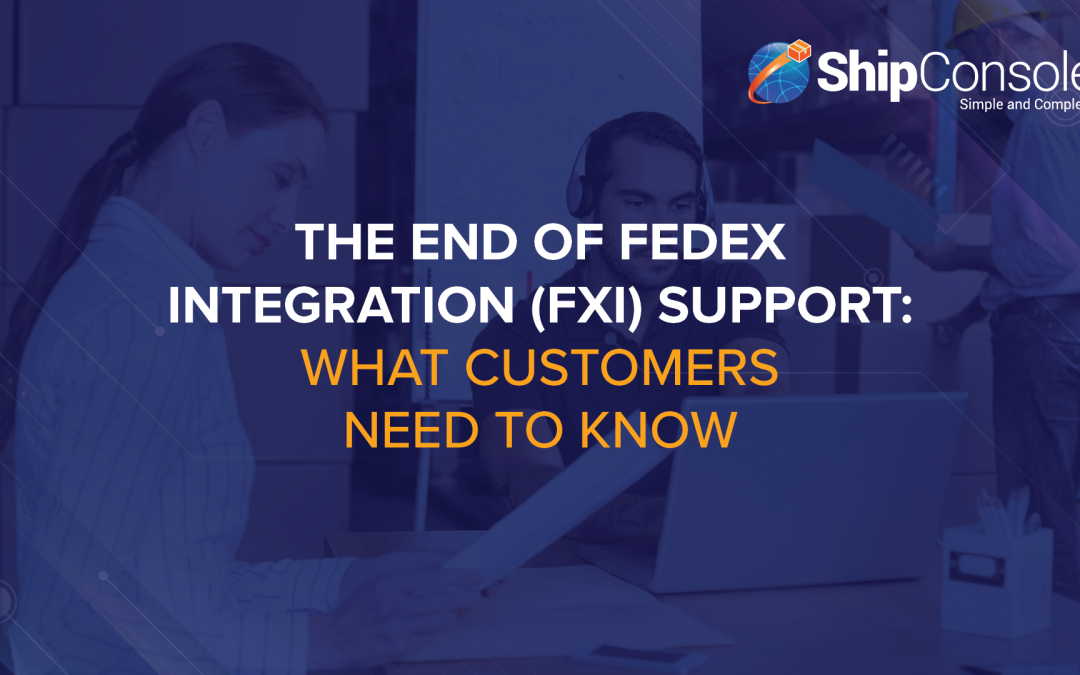FedEx is making a significant change in its integration offerings by discontinuing support for FedEx Integration (FXI) and replacing it with FedEx RESTful APIs. Effective August 31, 2024, FedEx has also begun disabling key FedEx Web Services WSDLs, including Tracking, Address Validation, and Validate Postal Codes. These SOAP-based Web Services are now in development containment, and businesses relying on FXI or SOAP-based WSDLs need to transition to modern alternatives.
Here’s what customers need to know about this shift, the potential challenges, and the best options available for seamless shipping operations.
Why Is FedEx Ending FedEx Integration (FXI) and SOAP-based Web Services Support?
FedEx’s decision to phase out FXI and SOAP-based Web Services aligns with its long-term strategy to modernize shipping integrations. The move to FedEx RESTful APIs provides several benefits, including:
- Enhanced Performance: Faster processing times and improved data accuracy.
- Scalability: Cloud-based integrations that adapt to business growth.
- Security Improvements: Advanced encryption and authentication mechanisms.
- Better Developer Support: Simplified API documentation and easier implementation.
What Are the Risks of Continuing with FedEx Integration (FXI) or SOAP-based Web Services?
Businesses that continue using FXI or SOAP-based Web Services despite its deprecation face several risks:
- Loss of Functionality: Once the Web Services WSDLs are disabled, they will no longer function, causing potential disruptions in shipping processes.
- Security Vulnerabilities: Without ongoing updates, SOAP-based integrations become increasingly susceptible to cyber threats.
- Integration Challenges: Future FedEx updates will only be available via RESTful APIs, making SOAP integrations obsolete.
How FedEx RESTful APIs Improve Shipping Efficiency
FedEx RESTful APIs offer advanced features that modern businesses need, including:
- Real-Time Tracking: Get instant updates on shipment statuses.
- Enhanced Address Validation: Reduce errors and improve delivery accuracy.
- Flexible Rate Quoting: Compare shipping rates with greater efficiency.
- Scalable Architecture: Handle high-volume shipping demands seamlessly.
Alternatives for Businesses Transitioning from FedEx Integration (FXI) and SOAP-based Web Services
For companies looking for a seamless transition, here are some robust alternatives:
- FedEx RESTful APIs
FedEx now provides a modernized API suite designed for streamlined integration, offering:
- Secure and reliable connectivity
- Enhanced shipping automation
- Support for multi-carrier logistics
- Third-Party Software Like ShipConsole
As a FedEx Compatible partner, ShipConsole offers an advanced, fully integrated shipping solution designed for businesses using Oracle ERPs. Key features include:
- Multi-Carrier, Multi-Modal Shipping: Manage parcel and freight shipments from a single platform.
- Seamless Oracle ERP Integration: Works with Oracle E-Business Suite, Oracle Cloud ERP, JD Edwards, and NetSuite.
- Real-Time Tracking & Reporting: Gain full visibility into shipments and delivery performance.
- Rate Shopping & Cost Optimization: Compare carrier rates and transit times to reduce costs.
- Automated Customs Documentation: Simplify international shipping compliance.
- User-Friendly Dashboards: Monitor shipping performance with actionable analytics.
What Businesses Are Doing to Prepare
Many businesses affected by this transition are taking proactive steps, including:
- Migrating to RESTful APIs: Upgrading from FXI or SOAP-based Web Services to FedEx’s latest API solutions.
- Adopting Third-Party Solutions: Leveraging platforms like ShipConsole to manage all shipping needs in one place.
- Enhancing Security & Compliance: Ensuring integration remains secure and up to date.
Key Takeaways
The end of support for FedEx Integration (FXI) and FedEx’s SOAP-based Web Services marks a significant shift in shipping technology. While this change presents challenges for businesses relying on SOAP-based integrations, it also offers an opportunity to adopt more efficient, secure, and scalable solutions.
By transitioning to FedEx RESTful APIs or leveraging advanced shipping platforms like ShipConsole, companies can ensure smooth operations, enhance efficiency, and future-proof their shipping processes.
Need Help with Your Shipping Integration? ShipConsole provides an all-in-one shipping solution tailored for businesses using Oracle ERPs. Contact us today to learn how we can help you transition seamlessly from FXI or SOAP-based Web Services to a modern shipping solution!

Pavan Telluru works as a Product Manager at ShipConsole. He brings over a decade of experience to his current role where he’s dedicated to conducting product demos to prospects and partners about how to organizations can efficiently manage their shipping execution process. He also leads marketing efforts at ShipConsole.


